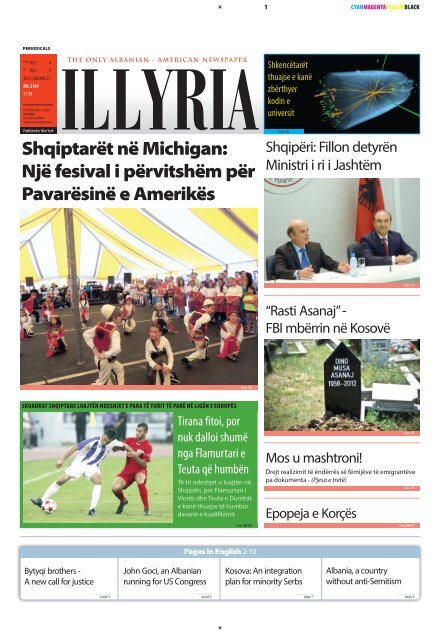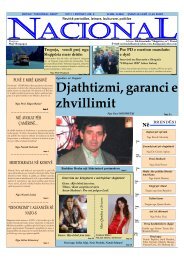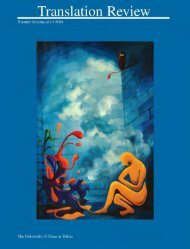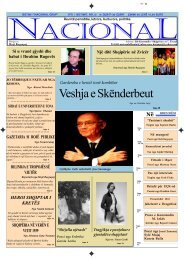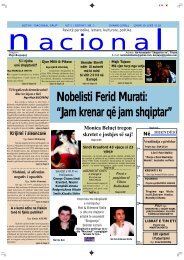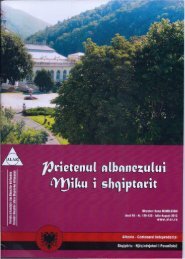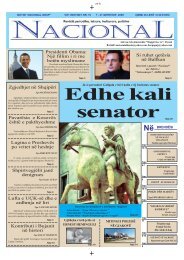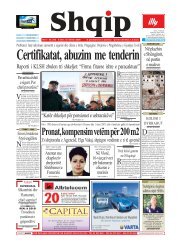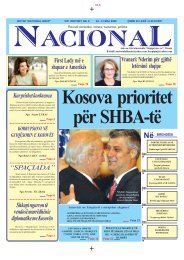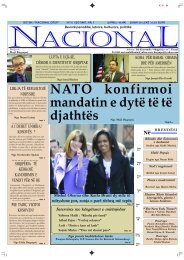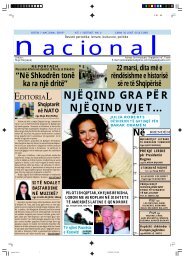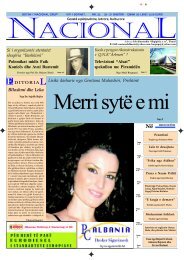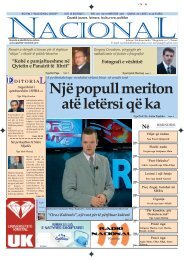Albania free from anti-Semitism - Home | The Official GjekÄ Marinaj ...
Albania free from anti-Semitism - Home | The Official GjekÄ Marinaj ...
Albania free from anti-Semitism - Home | The Official GjekÄ Marinaj ...
Create successful ePaper yourself
Turn your PDF publications into a flip-book with our unique Google optimized e-Paper software.
T<br />
1 CYANMAGENTAYELLOWBLACK<br />
PERIODICALS<br />
FROM<br />
JULY 6<br />
TO<br />
JULY 9<br />
2012, VOLUME 21<br />
NO. 2164<br />
$1.50<br />
COPYRIGHT © 2012<br />
ILLYRIA<br />
THE ONLY ALBANIAN -<br />
AMERICAN NEWSPAPER, INC.<br />
THE ONLY ALBANIAN - AMERIC AN NEWSPAPER<br />
Shkencëtarët<br />
thuajse e kanë<br />
zbërthyer<br />
kodin e<br />
universit<br />
Published in New York<br />
Shqiptarët në Michigan:<br />
Një fesival i përvitshëm për<br />
Pavarësinë e Amerikës<br />
faqe 33<br />
Shqipëri: Fillon detyrën<br />
Ministri i ri i Jashtëm<br />
faqe 15<br />
“Rasti Asanaj” -<br />
FBI mbërrin në Kosovë<br />
faqe 25<br />
SKUADRAT SHQIPTARE LUAJTËN NDESHJET E PARA TË TURIT TË PARË NË LIGËN E EUROPËS<br />
Tirana fitoi, por<br />
nuk dalloi shumë<br />
nga Flamurtari e<br />
Teuta që humbën<br />
Të tri ndeshjet u luajtën në<br />
Shqipëri, por Flamurtari i<br />
Vlorës dhe Teuta e Durrësit<br />
e kanë thuajse të humbur<br />
davanë e kualifikimit<br />
faqe 38-39<br />
Mos u mashtroni!<br />
faqe 16<br />
Drejt realizimit tё ёndёrrёs sё fёmijёve tё emigrantёve<br />
pa dokumenta - (Pjesa e tretё)<br />
Epopeja e Korçës<br />
faqe 27<br />
faqe 36-37<br />
Pages in English 2-10<br />
Bytyqi brothers -<br />
A new call for justice<br />
John Goci, an <strong>Albania</strong>n<br />
running for US Congress<br />
Kosova: An integration<br />
plan for minority Serbs<br />
<strong>Albania</strong>, a country<br />
without <strong>anti</strong>-<strong>Semitism</strong><br />
page 4 page 5 page 7 page 8<br />
T
8<br />
#2164 JULY 6 - 9, 2012<br />
#2164 JULY 6 - 9, 2012<br />
9<br />
<strong>Albania</strong>, a country <strong>free</strong> <strong>from</strong><br />
the epidemic of <strong>anti</strong>-<strong>Semitism</strong><br />
By Gjekë <strong>Marinaj</strong><br />
Jews and non-Jews alike — including<br />
scholars, diplomats, and ordinary<br />
citizens — have written and testified<br />
that every Jew who stayed within the<br />
borders of <strong>Albania</strong> during the Holocaust<br />
managed to survive. But all the<br />
studies and proclamations are not sufficient<br />
to understand the magnitude<br />
of this group demonstration of compassion<br />
that took place in <strong>Albania</strong> during<br />
the Holocaust — the worst organized<br />
crime ever committed in the history<br />
of humankind.<br />
Escaping <strong>from</strong> such countries as<br />
Germany, Austria, Poland, Russia, Serbia,<br />
Greece, and Kosova, some 2,000<br />
Jews entered <strong>Albania</strong> between 1939<br />
and 1944. <strong>The</strong>y joined approximately<br />
200 <strong>Albania</strong>n Jews who were already<br />
residents of the country. <strong>The</strong> new<br />
arrivals carried with them memories<br />
of the homes and Jewish communities<br />
they had left behind, and mourned<br />
family members, children, and loved<br />
ones who died of hunger in the ghettos,<br />
were executed, or were brutally murdered<br />
in the gas chambers by the Nazis.<br />
<strong>The</strong>y took a great risk by trusting their<br />
lives with <strong>Albania</strong>, one of the smallest,<br />
poorest, and most primitive countries<br />
in Europe at the time.<br />
According to many survivors, the<br />
decision to come to <strong>Albania</strong> was one<br />
they never regretted, nor were they<br />
ever disappointed by their treatment<br />
in the country. It is my belief that they<br />
survived because they found a country<br />
whose people were not affected by the<br />
epidemic of <strong>anti</strong>-<strong>Semitism</strong> that had<br />
been the root cause of the Holocaust<br />
throughout Europe. This essay will go<br />
even further, arguing the following:<br />
<strong>The</strong> <strong>Albania</strong>ns were well informed that<br />
the Jewish people had been great<br />
friends and supporters of <strong>Albania</strong>.<br />
Even further, by recognizing and experiencing<br />
the unparalleled religious tolerance<br />
found in <strong>Albania</strong>, the Jews were<br />
able to play an important role in the<br />
development of the friendship that<br />
continues today between <strong>Albania</strong> and<br />
Israel. Indeed, the benefits to local<br />
society were not one-sided. <strong>The</strong> Jewish<br />
refugees were able to develop social<br />
appreciation in the hearts of the <strong>Albania</strong>n<br />
people. That pushed the <strong>Albania</strong>n<br />
government(s) of the wartime years<br />
(including the puppet governments),<br />
to act positively by ignoring German<br />
orders to enforce laws against the Jews.<br />
But most significantly, because it simply<br />
was the right thing to do, the <strong>Albania</strong>n<br />
people were willing to take dangerous<br />
risks to save the lives of the<br />
Jewish refugees they considered to be<br />
their guests.<br />
History has proven that the Jewish<br />
people have been supporters of the<br />
<strong>Albania</strong>n people through the centuries.<br />
As even <strong>Albania</strong>n legends give evidence,<br />
the friendship between <strong>Albania</strong>ns<br />
and Jews had started long before<br />
the Holocaust — about 2,000 years<br />
earlier. <strong>The</strong> first Jewish slaves being<br />
transported <strong>from</strong> Palestine to Italy<br />
were shipwrecked on the shores of the<br />
Adriatic Sea. Soon after entering <strong>Albania</strong>,<br />
they were <strong>free</strong>d of their status as<br />
slaves and became active <strong>Albania</strong>n citizens.<br />
<strong>The</strong>y were among the first people<br />
to witness one of the most human<br />
aspects of that country’s tradition:<br />
<strong>Albania</strong>ns consider their houses to be<br />
the home of God, and guests are to be<br />
treated as one of their own.<br />
After they regrouped, the Romans<br />
went back to <strong>Albania</strong> to either recapture<br />
or kill the Jews. <strong>The</strong>y experienced<br />
another side of <strong>Albania</strong>n tradition as<br />
they encountered a feisty fighting resistance<br />
<strong>from</strong> a people who were deeply<br />
offended that their new Jewish guests<br />
were being hunted.<br />
According to historian Zef Gjergji,<br />
Jewish Refugee Children Celebrate at a Birthday Party in Kavaja, <strong>Albania</strong>, 1942. (Photo: Mosa Mandil)<br />
by the end of the 4 th century, Jews had<br />
created their own communities in <strong>Albania</strong>.<br />
<strong>The</strong>y not only managed to live<br />
independently, but also helped the<br />
country to develop an organized economic<br />
system, introducing them to<br />
“the international trade concept”<br />
(Gjergji). Although “there is no knowledge<br />
of the number of Jews in the<br />
area during this early period, there is<br />
conclusive evidence of a Jewish presence.<br />
<strong>The</strong>re were some villages in<br />
North <strong>Albania</strong> which had all Jewish<br />
populations in ancient times, and some<br />
that had Jewish names, e.g. Palasa-<br />
Palestine and Orikum-Jericho” (Sarner<br />
8). After such a good start, the relationship<br />
between the Jews and the<br />
<strong>Albania</strong>ns reached even higher levels.<br />
Perhaps the greatest support of the<br />
Jews came at <strong>Albania</strong>’s most important<br />
moment. In 1912, <strong>Albania</strong> was struggling<br />
to win its independence <strong>from</strong><br />
the Ottoman Empire. <strong>The</strong> country<br />
encountered great resistance <strong>from</strong> its<br />
neighbors, especially <strong>from</strong> Yugoslavia,<br />
which wanted its own territorial access<br />
to the Adriatic Sea. Thanks in part to<br />
the Jewish people, who had an indirect<br />
connection with certain higher-level<br />
Austrian officials, on Nov. 28, 1912,<br />
<strong>Albania</strong> was able to declare its permanent<br />
independence <strong>from</strong> the Ottomans.<br />
Just months later, fearing a possible<br />
international conspiracy to reverse<br />
<strong>Albania</strong>n’s independence, <strong>The</strong> Jewish<br />
Criterion was among the first foreign<br />
publications to print the <strong>Albania</strong>n<br />
nationalistic slogan — “<strong>Albania</strong> for the<br />
<strong>Albania</strong>ns” (<strong>The</strong> Jewish Criterion —<br />
Volume 35 Issue 22 1913-01-03 Page<br />
1).<br />
<strong>The</strong>se large acts on the international<br />
stage are rarely mentioned by the Jewish<br />
people or the Jewish media.<br />
Instead, such Holocaust survivors as<br />
Johanna J. Neumann and children of<br />
survivors including Dr. Anna Kohen,<br />
who crossed the borders into <strong>Albania</strong><br />
carrying with them nothing but their<br />
clothes, tend to remember most the<br />
acts of kindness they received when<br />
they express their love and appreciation<br />
for <strong>Albania</strong> and the <strong>Albania</strong>ns.<br />
“I simply loved the school and felt<br />
so good that finally I was like other<br />
children, a pupil at school… As winter<br />
approached and the heavy rains started,<br />
it became more and more difficult<br />
to get to school, but I don’t think that<br />
I ever missed a day and I was very<br />
happy. On occasions when the teacher<br />
had to be out of the class she would<br />
ask me to take over and teach the<br />
children” (Neumann 43).<br />
Dr. Kohen says:<br />
“<strong>The</strong>re is a small country in the<br />
heartland of Europe called <strong>Albania</strong><br />
where I was fortunately born, where<br />
hospitality to foreigners is part of<br />
their tradition. During the Second<br />
World War, not only did the <strong>Albania</strong>ns<br />
save all the Jews who were living<br />
among them but they dared to share<br />
their homes, their food, and their lives<br />
with them. <strong>Albania</strong> has its share of<br />
Oscar Shindlers and, indeed, so many<br />
that we could never have thanked<br />
each glorious one of them” (A. Kohen).<br />
<strong>Albania</strong>ns were grateful for having<br />
the Jews in their midst as well. <strong>Albania</strong>n<br />
scholar Vladimir Qirjaqi praises<br />
the Jews of the city of Gjirokastra for<br />
not only “improving the city’s social<br />
life in a way that was unknown to<br />
them before, but also for giving it a<br />
western outlook including a new way<br />
of conducting business” (Shekulli). It<br />
was this kind of reciprocal respect and<br />
admiration that inspired many Jews<br />
— including Pepe Biro Kantos, David<br />
Koen, and Josef Bivas — to join the<br />
<strong>Albania</strong>n partisans and risk their lives<br />
for the <strong>free</strong>dom of the <strong>Albania</strong>n people.<br />
<strong>The</strong>ir sacrifice was well received, especially<br />
by the children, who could learn<br />
to speak in each other’s language and<br />
play together <strong>free</strong>ly on the streets. Jasa<br />
Altarac agrees. He was about 10 years<br />
old when his family arrived in <strong>Albania</strong>,<br />
escaping the mass killings of the Jews<br />
in his birthplace of Serbia. As he recalls:<br />
“We, the children, had a wonderful<br />
time playing in the orchards, in the<br />
fields and at a nearby brook. We also<br />
went to visit friends in Jewish families<br />
around, in our estate and in the nearby<br />
estates” (Altarac).<br />
This was possible because the Jews,<br />
the Moslems, the Catholics, and the<br />
Greek Orthodox all utilized spiritual<br />
diversity as a medium to survive hard<br />
times. <strong>The</strong>y recognized God as the creator<br />
of all people. By doing so, they<br />
were able to communicate with one<br />
another and to enjoy an unprecedented<br />
religious tolerance, which played a<br />
great role in the development of a new<br />
friendship among all groups:<br />
“One day I had a particularly moving<br />
experience. I was playing not far<br />
<strong>from</strong> our house, where there was a<br />
big field; Intrigued by the big and<br />
plump ears of wheat that grew there,<br />
I took one ear full with grain and as I<br />
examined the ear and the big grains;<br />
the old farmer who was working in<br />
the field approached me and said:<br />
‘yes, it is a good year, we have guests<br />
and God sent us a nice crop’” (Jasa<br />
Altarac).<br />
Fortunately, the <strong>Albania</strong>n Catholic<br />
Church found itself removed <strong>from</strong><br />
European Catholic Church tradition<br />
and did not participate in the organized<br />
campaign to encourage its members<br />
and the world to actively employ traditional<br />
hatred against the Jews. As<br />
an institution, it did not take any<br />
notable action to help the Jews, but<br />
many Catholics independently joined<br />
the call of Moslem spiritual leaders in<br />
<strong>Albania</strong> who utilized their influence to<br />
promote social equality among all<br />
humans, without regard to their religious<br />
faith. <strong>The</strong> Moslem followers who<br />
made up the majority of the religious<br />
presence in <strong>Albania</strong> (along with the<br />
members of the other two faiths) were<br />
aware of traditional Jewish good deeds<br />
and the fact that no Jew was ever convicted<br />
for committing a crime in <strong>Albania</strong>.<br />
<strong>The</strong>y recognized the great danger<br />
the Jews faced if captured by the Nazis<br />
and did everything they could to save<br />
them. <strong>The</strong>se acts did not go unnoticed<br />
by the survivors:<br />
“<strong>The</strong> <strong>Albania</strong>n population as a<br />
whole, <strong>from</strong> all walks of life, helped<br />
the Jews all along; <strong>from</strong> the poorest<br />
farmer in a remote village that in the<br />
middle of the night would open his<br />
house, feed and offer his own bed to<br />
the tired refugees, all the way to the<br />
very top of the <strong>Albania</strong>n society, the<br />
wealthy families like the Toptanis and<br />
the Frasheris” (Jasa Altarac).<br />
Jews, many of whom came <strong>from</strong><br />
Germany, where their great scientific<br />
ideas and inventions were discarded<br />
just because they were Jews, never<br />
hesitated to go to mosques when invited<br />
by their Moslem friends, as Newman<br />
remarks: “Our Moslem neighbors<br />
also invited us to come to the Mosque<br />
with them, which we did. <strong>The</strong> people<br />
were very friendly to us. <strong>Albania</strong>ns are<br />
in general very hospitable” (38). Many<br />
Jews were so prejudice-<strong>free</strong> and grateful<br />
for their friendly reception by the<br />
<strong>Albania</strong>ns that some of them took<br />
Moslem names as a disguise <strong>from</strong> the<br />
Nazis. As Kohen elaborates:<br />
“My parents, Nina and David<br />
Kohen, came <strong>from</strong> Janina, Greece.<br />
<strong>The</strong>y were living in Vlora when the<br />
Nazis invaded <strong>Albania</strong>. <strong>The</strong>y fled to<br />
the mountains and hid in a small<br />
Moslem village called Trevlazer. <strong>The</strong>y<br />
took Moslem names, my father David<br />
became Daut, my mother Nina<br />
became Bule, and my brother Elio<br />
became Ali. Everyone in the village<br />
knew they were Jews but not one<br />
betrayed them” (Kohen).<br />
Neither the Greek Orthodox nor<br />
the Catholic Church was particularly<br />
active in facilitating the needs of the<br />
Jews, but they never launched any<br />
campaigns against them.<br />
<strong>The</strong> <strong>Albania</strong>n government appeared<br />
to be more active in helping the Jews.<br />
It understood the feelings of its own<br />
people toward their guests and took<br />
the risk of ignoring German orders to<br />
enforce any laws against the Jews.<br />
Even though survivor Rina Shosberger<br />
feels that “the <strong>Albania</strong>n Government<br />
did not know the Jews were there”<br />
(Shosberger) and she gives all the<br />
Autumn 1944: Jewish refugees protected by <strong>Albania</strong>ns pose for a photo following the liberation of the country. (Photo: Refik Veseli)<br />
credit to the people who “were very<br />
helpful and did not betray the Jews to<br />
the Nazis” (Shosberger), the government<br />
did attempt to be helpful. In<br />
fact, the <strong>Albania</strong>n government was the<br />
only government that hoped for an<br />
increasing Jewish presence in the country.<br />
It helped to provide Jews with<br />
false names and documentation, and<br />
moved them around the country to<br />
confuse the Nazis and make their presence<br />
less visible: “As we constantly<br />
changed identities, with false documents<br />
I did not know who I was supposed<br />
to be at the moment” (Altarac).<br />
<strong>The</strong> truth is that <strong>Albania</strong> needed the<br />
Jews. It needed their business experience<br />
and innovative ideas, their education,<br />
and their expertise in science<br />
and art — and it did not hesitate to<br />
express this need. According to Harvey<br />
Sarner, while King Zog was in exile in<br />
Great Britain during the Second World<br />
War:<br />
“A plan was proposed to the<br />
British Jewish leadership for settling<br />
50,000 Jewish families in his<br />
country. He described <strong>Albania</strong> as<br />
a rich country with poor people<br />
and said that the population of one<br />
million was in a country that could<br />
easily absorb a population of five<br />
million. He proposed that each of<br />
the 50,000 families be given a<br />
small farm <strong>from</strong> lands owned by<br />
the state. <strong>The</strong> British Board of<br />
Deputies, the organization representing<br />
British Jews, took this proposal<br />
seriously enough to contact<br />
the British Foreign Office to see<br />
what they thought. <strong>The</strong> Foreign Office<br />
didn’t take this proposal seriously,<br />
and doubted that King Zog<br />
would be able to reestablish the<br />
monarchy in <strong>Albania</strong> after the Second<br />
World War. Nothing ever came<br />
of this offer and King Zog died in<br />
exile” (Sarner 13).<br />
<strong>The</strong> Germans knew about Zog’s<br />
proposal and insisted that the <strong>Albania</strong>n<br />
government provide them with a<br />
detailed list of the name and address<br />
of every Jew in the country. But that<br />
never happened. Johanna J. Neumann<br />
regrets that: “Not many Jews knew<br />
about <strong>Albania</strong> and the <strong>Albania</strong>ns. And<br />
that is too bad, because if they would<br />
have known, many more Jews would<br />
have been saved,” (Neumann, personal<br />
interview).<br />
Even when the temporary Italian<br />
government was replaced by the Germans<br />
in September 1943, the appointed<br />
<strong>Albania</strong>n leader Mehdi Frashëri<br />
had little resources and even less political<br />
power to seriously attend to the<br />
health, financial, and political needs<br />
of the Jews. Yet, understanding the<br />
circumstances, the little financial aid<br />
provided was welcomed by the Jewish<br />
refugees. <strong>The</strong> government never<br />
stopped the <strong>Albania</strong>n donors and the<br />
American relatives of the Jews who<br />
were willing to help. And there is no<br />
evidence that at any point the government<br />
pressured the Jews to make<br />
quick, important decisions against their<br />
will, including about moving in and<br />
out of the country.<br />
As most people would agree, however,<br />
one of the best things the government<br />
did was to refrain <strong>from</strong> taking<br />
any kind of punitive actions against<br />
<strong>Albania</strong>n citizens for helping Jews.<br />
Even though there is no evidence available<br />
of any <strong>Albania</strong>ns actually losing<br />
their lives while trying to protect the<br />
Jews, many put their lives in danger<br />
by trying to do so. During the course<br />
of my research for this essay, most of<br />
my sources mentioned the same names<br />
and told the same stories I had already<br />
read in arguably the best scholarly<br />
written book on this topic: Rescue in<br />
<strong>Albania</strong> by Harvey Sarner. It is only<br />
fair to use the following examples quoted<br />
<strong>from</strong> his text to illustrate some of<br />
the dangerous actions taken by the<br />
<strong>Albania</strong>ns to protect their guests:<br />
“In 1942, there were Jewish<br />
refugees <strong>free</strong>d <strong>from</strong> Italian jails who<br />
were moved to Kavaja. <strong>The</strong> Jewish<br />
families didn’t have <strong>Albania</strong>n identification<br />
papers, which was a problem.<br />
Mihal Lekatari, an Orthodox Christian<br />
boy of 17, understood the danger facing<br />
the Jewish families. Early one<br />
morning, Mihal armed himself and<br />
went to the police headquarters. He<br />
didn’t expect any one would be there<br />
that early but found a secretary<br />
already at work. He took all the blank<br />
identity cards, about 50, and threatened<br />
the secretary with death “for<br />
you and your family if you report<br />
me.<br />
Refik Veseli’s family gave the Jewish<br />
families shelter for an entire year.<br />
<strong>The</strong>re was a cave about 50 meters<br />
<strong>from</strong> the Veseli house, and the Jewish<br />
adults went to the cave when Germans<br />
came looking for Jews. Not once were<br />
they made to feel an unwelcome burden,<br />
and all financial compensation<br />
was refused.<br />
Beqir Qoqja’s Jewish friend, Avraham<br />
Eliasaf (who used the Moslem<br />
name of Gani), was living in Beqir’s<br />
tailor shop in Tirana. When the Germans<br />
made a ‘sweep’ looking for Jews<br />
they agreed it was safer to move<br />
Avraham to a remote village where<br />
he would ‘pass’ as a Moslem. Avraham<br />
had some gold coins that he gave<br />
Beqir for helping him. After liberation,<br />
Beqir returned the gold coins to his<br />
friend and refused all compensation,<br />
and took offense at the suggestion<br />
that he take the gold coins.<br />
Over 80 fugitive Jews, mostly<br />
unknown to her, passed through the<br />
home of Nadire Bixhiu, who found<br />
places of safety for them. Hoxha Ferri<br />
guided many Jews to the village of<br />
Zall-Herr, where he had a spacious<br />
house. <strong>The</strong>re was a big crowd and<br />
they fed 80 people <strong>from</strong> this house,<br />
including some Italian soldiers who<br />
escaped <strong>from</strong> the army when Italy<br />
surrendered” (Sarner 46-48).<br />
While interviewing Felicita Jakoel,<br />
the daughter of the famous Holocaust<br />
survivor Josef Jakoel, I asked her if<br />
there were traces of <strong>anti</strong>-<strong>Semitism</strong> in<br />
<strong>Albania</strong>. <strong>The</strong> question, it seemed to<br />
me, irritated her: “Look, <strong>anti</strong>-<strong>Semitism</strong><br />
never took place in <strong>Albania</strong>,” she said,<br />
slightly raising her voice. In a March<br />
2006 article, the Israeli ambassador<br />
Mark Sofer said to the Southeast European<br />
Times: “Not only in Israel, but<br />
all over the world, Jews admired <strong>Albania</strong>.<br />
Not just for the period of World<br />
War II, when <strong>Albania</strong> saved the Jews,<br />
but also because the country is wellknown<br />
for its respect towards us. I<br />
can say that <strong>Albania</strong> has never had<br />
<strong>anti</strong>-<strong>Semitism</strong>” (Southeast European<br />
Times 1). Similarly, the first Jewish<br />
diplomat ever to hold the post of the<br />
American ambassador to <strong>Albania</strong><br />
(1930-1933), Herman Bernstein, was<br />
quoted by the <strong>The</strong> Jewish Daily Bulletin<br />
on April 17, 1934, as saying: “<strong>The</strong>re<br />
is no trace of any discrimination against<br />
Jews in <strong>Albania</strong> because <strong>Albania</strong> happens<br />
to be one of the rare lands in<br />
Europe today where religious prejudice<br />
and hatred do not exist, even though<br />
<strong>Albania</strong>ns themselves are divided into<br />
three faiths…” (<strong>The</strong> Jewish Daily Bulletin<br />
1).<br />
My point is that if an ambassador,<br />
who lived in <strong>Albania</strong> nearly eight<br />
decades ago, an Israeli contemporary<br />
diplomat (who is working on maintaining<br />
good relations with <strong>Albania</strong>) a<br />
few years ago, and Holocaust survivors<br />
and their children all say that there<br />
was no <strong>anti</strong>-<strong>Semitism</strong> in <strong>Albania</strong>, then<br />
that is a good indication that it must<br />
be true. And I believe that this essay<br />
has demonstrated that the Jews managed<br />
to survive in <strong>Albania</strong> because,<br />
once more, they found a country where<br />
its people were not affected by the epidemic<br />
of <strong>anti</strong>-<strong>Semitism</strong> that had been<br />
the root cause of the Holocaust<br />
throughout Europe. It is not as if this<br />
<strong>Albania</strong>n phenomenon made no sense:<br />
For many centuries the <strong>Albania</strong>n people<br />
had been slaughtered by Turkish<br />
swords, killed by the Italian aviators,<br />
and executed by the German Nazis.<br />
As a result, they fought with everything<br />
they had, endangering their lives in<br />
order to be liberated <strong>from</strong> their ruthless<br />
enemies. <strong>The</strong>n along came the Jews,<br />
whose long history of suffering and<br />
discrimination reached the highest climax<br />
ever seen in the history of<br />
humankind, asking for a temporary<br />
place to stay, and to survive the brutalities<br />
of the German Nazis. Based on<br />
a history of mutually beneficial cooperation,<br />
<strong>Albania</strong> decided that it was<br />
worth taking the same risks to save<br />
the Jews that it had taken when fighting<br />
its own enemies to save honor,<br />
identity and <strong>free</strong>dom. <strong>Albania</strong>, indeed,<br />
made the right choice!<br />
Works Cited<br />
Altarac, Iasa. Personal experience<br />
in <strong>Albania</strong> as Holocaust survivor.<br />
Gjekë <strong>Marinaj</strong>.<br />
November 2008.<br />
Androkli, Ostallarit. Jani Tomaj.<br />
Xhevat Lloshi. Mico Samara. <strong>The</strong><br />
<strong>Albania</strong>n Dictionary.<br />
Tirana: <strong>Albania</strong>n Press, 1980.<br />
Avramovitch, Aharon. Personal<br />
experiance in <strong>Albania</strong> during the holocaust.<br />
Gjekë <strong>Marinaj</strong>. 15<br />
November 2008.<br />
Editorial. “Jewish Survival in <strong>Albania</strong><br />
and the Ethics of Besa.” <strong>The</strong> Jewish<br />
Daily Bulletin 17 April 1934: 9.<br />
DioGuardi, Shirley. “Jewish Survival<br />
in <strong>Albania</strong> & the Ethics of ‘Besa’.”<br />
Congress Monthly.<br />
American Jewish Congress, January/February<br />
2006: 7-10.<br />
Dukagjini, Leke. Gjecov, Shtjefen.<br />
<strong>The</strong> Conduct of Leke Dukagjini. Trans.<br />
Leonard Fox. New<br />
York: Gjonlekaj Publishing Company,<br />
1989.<br />
Elsie, Robert. A dictionary of<br />
<strong>Albania</strong>n Religion, Mythology, and<br />
Folk Culture. London: Hurst<br />
& Company, 2001.<br />
Gjergji, Zef. Jews in <strong>Albania</strong>. Gjekë<br />
<strong>Marinaj</strong>. 08 October 2008.<br />
Kohen, Anna. Interview. Gjekë<br />
<strong>Marinaj</strong>. 04 October 2008.<br />
<strong>Marinaj</strong>, Gjekë. “Hidden in a Muslim<br />
home.” <strong>The</strong> Poet’s Times (1997):<br />
5.<br />
Newmann, Johanna J. A personal<br />
Account. Silver Spring : Unpublished,<br />
1990.<br />
Sarner, Harvey. Rescue In <strong>Albania</strong>.<br />
Cathedral City: Brunswick Press, 1997.<br />
Selimaj, Erlis. “Southeast European<br />
Times.” <strong>Albania</strong>, Israel to boost relations<br />
28 March 2006.<br />
Bani, Entela. “Shekulli.” Familja<br />
Hebre që i Mësoi Frëngjishten Enver<br />
Hoxhës. 06 August 2008<br />
Shosberger, Rina. My childhood<br />
experience in <strong>Albania</strong> during the Holocaust.<br />
Gjekë <strong>Marinaj</strong>. 09 November<br />
2008.<br />
Johanna J. Neumann (right), a Holocaust survivor and Dr. Anna Kohen, daughter of Holocaust survivor, in front of the photo showing<br />
the portrait of the man who saved Neumann’s family, during the opening ceremony for an exhibition in the United Nations in New<br />
York, honoring <strong>Albania</strong>ns who saved the Jews during the Holocaust, in 2009. (Photo by Ruben Avxhiu)


